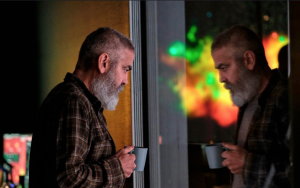THE MIDNIGHT SKY: 3 ½ STARS. “humanistic sci fi that values ideas over action.”
 Although “The Midnight Sky,” a new apocalyptic thriller from George Clooney and now streaming on Netflix, was written and filmed before the pandemic, timely themes of isolation and the importance of human connection resonate loudly throughout.
Although “The Midnight Sky,” a new apocalyptic thriller from George Clooney and now streaming on Netflix, was written and filmed before the pandemic, timely themes of isolation and the importance of human connection resonate loudly throughout.
Set in the near future, Clooney, who directed, produced and resembles q post “Late Show” David Letterman here, stars as Augustine, an astronomer battling cancer and loneliness at the Barbeau Observatory, a remote Arctic research station. Some sort of global nuclear catastrophe has devastated life on earth, leaving him isolated and alone until Iris, a wide-eyed, silent girl (Caoilinn Springall) mysteriously turns up at the station.
While tending to his new charge, Augustine is duty bound to contact and warn the Aether, a NASA space station returning home after a two-year mission exploring a newly discovered moon of Jupiter.
Led by husband-and-wife Adewole and Sully (David Oyelowo and Felicity Jones), the crew (Kyle Chandler, Demian Bichir, Tiffany Boone), hurtle toward the barren planet, unaware that life as they knew it on earth has ceased.
“Are you receiving this?” Augustine, says, fruitlessly trying to communicate with the Aether. “Is anyone out there?” To reach them Augustine and Iris take on a dangerous mission, a trek through kilometres of deadly ice, snow and 80-kilometre-per-hour winds. “There is antenna that’s stronger than ours,” he says. “If we can get to that antenna, they’ll hear us.”
“The Midnight Sky” is a multi-hyphenate, a dystopian-sci-fi-outer-space-thriller. While that’s accurate, that’s also six too many words to correctly describe what Clooney has created. All those elements exist in the film but the unwieldy list leaves out the film’s humanity. Sure, there’s some wild blue yonder action with people floating through space capsules and a barren planet, but this is a story of regret and redemption, handled with subtlety and grace.
The story has two distinct halves. Clooney says “half of it is “Gravity” and the other half of it is “The Revenant,” and sometimes they feel too distinct; disconnected. Augustine’s journey to redemption as he nears death is heavy-hearted and austere. The crew’s situation is different. Although they are cut loose in space, they represent the future of humankind, in whatever form that may take. The two halves sit side-by-side but don’t always fit together like puzzle pieces.
The thing that binds the story threads is a search for salvation. Augustine and Iris and Sully, who is expecting a child, are among the last of human life, and face an uncertain future. Each is doing what they can to determine whether mankind has a chance or not. And while the film offers hope and a chance of recovery, both personally for the characters and for the world as a whole, it does so without pandering to easy plot points.
Based on the 2016 Lily Brooks-Dalton novel “Good Morning, Midnight” with a screenplay by Mark L. Smith (screenwriter of “The Revenant”), “The Midnight Sky” is deliberately paced, humanistic sci fi that values ideas over action. It has epic scenes—particularly the snow storm trek—but feels more like an intimate drama than high action film. Clooney uses silence to speak loudly about the film’s most timely and important theme, the need for connection. It’s the lesson of the film and, these days, in real life.
